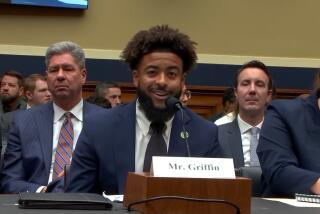Streak of Harsh Moralism Injected Into 976 Debate Is Clearly a Wrong Number
- Share via
Faced with angry protests from moralists and concerned parents, regulatory agencies, Congress and state legislatures are in a dither these days to either restrict or eliminate “dial-a-porn” messages that can be obtained, for a fee, by calling 976 telephone numbers. But, by responding to this intense fire, regulators risk an important freedom that we have come to take for granted: our right to use the phone to share information, on our own terms, with whomever we want.
The 976 conundrum is a metaphor, a mirror. It speaks volumes for how ill-equipped we are, in this technologically advanced society, to plan for technology’s effects. It reminds us how communication technologies once thought noble by their inventors--television, video, cable and now the telephone--are being used perversely to distribute programming that is shallow, exploitative and violent.
This dark glass reflects another image, too--that of a society incapable of admitting, let alone satisfying, the profoundly human need for sensual experience.
That none of this is being mentioned in the current hysteria to curb 976 dial-a-porn services is sad--but not surprising. The race is on for a technological “fix” to what is, after all, a problem of politics and ethics. In California, as in other states, regulators are promulgating regulations and legislators laws to reduce the access of children to these suggestive messages. A recent ruling by the Public Utilities Commission allows Pacific Bell to block the receipt of 976 services by residential customers for a nominal $2 charge. Legislation now percolating in Sacramento would eliminate the charge altogether.
This is not enough for some people, who would like to see dial-a-porn simply exterminated. These include Pacific Bell, the telephone colossus, which announces in a press release that it is “disgusted by this filth.” In proposals to the PUC and to the Legislature, Pacific Bell has asked for absolute discretion to determine which “information providers” merit carriage on its networks.
But is a telephone company, even with its high moral standards, qualified to play censor for the customers? Once dial-a-porn services are banished from the phone network, who will be next? Lottery results? Political activists? Companies that want to compete with Pacific Bell to provide future information services (for example, electronic Yellow Pages)? Pacific Bell’s own dissident shareholders?
Regrettably, we are thoroughly unequipped as a society to anticipate the consequences of new technological developments. Thus, when crises arise from the application of new technologies (even tempests in a teapot like 976), we are forced to resort to draconian, after-the-fact solutions like those being discussed in the Legislature. These solutions can do as much damage as they repair.
Without being too pollyanna-ish about the possibilities for technology planning in our competitive economy, we can observe other societies in which technology policy is more highly honored in the barrel than in the breach. In Australia, for example, citizens join with telephone managers and technologists to decide the future shape of the telecommunications network and the services that it will provide. In Sweden, special committees of distinguished individuals regularly debate which technologies are and are not in society’s best interest. These decisions are made publicly, in full sight of the press and by persons accountable to the citizenry. Here, technology policy is made privately, in corporate board rooms and in regulatory corridors.
The other half of the 976 dilemma is less amenable to structural solutions. A streak of harsh moralism is part and parcel of the American experience. For some, all sensation is immoral and sensuality is a sin. One wonders why those who hold these beliefs are so often the same people complaining that their children are making prolific use of dial-a-porn services. If adherence to a strict morality is part of their code, why is it that they cannot convey this fidelity to their children?
Clearly, 976 services have a market. They generate hundreds of millions of dollars annually for the service providers and the telephone companies. Obviously, more than children are using these services. Probably hundreds of thousands of Californians call these services; more of them probably would if they could keep their phone bills private. These crude messages cannot meet deeply felt needs for companionship and sensual experience, but for many people they are all that is available without jeopardizing their personal health or reputation.
The question now is: Will information services mature into a useful industry--or, rather, will we mature sufficiently to allow them to grow beyond pornography and dial-a-Santa? This question deserves more than the current outrage, which, whether naive or cynical, is almost sure to produce an unworkable solution to the 976 problem.
More to Read
Get the L.A. Times Politics newsletter
Deeply reported insights into legislation, politics and policy from Sacramento, Washington and beyond. In your inbox twice per week.
You may occasionally receive promotional content from the Los Angeles Times.










